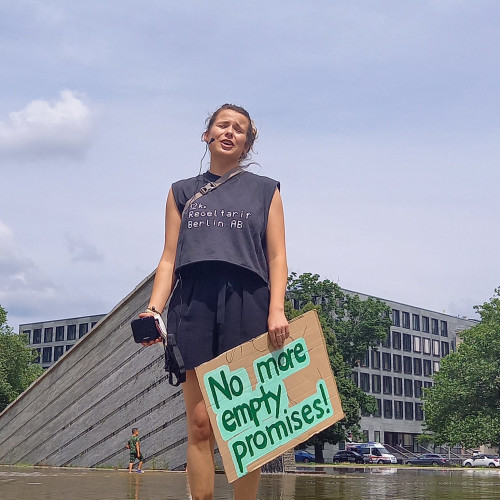Youth climate movement drives public debate about policy
Climate protests and their policy impact
Contents
The largest - and arguably most well-known - climate action group in Germany is Fridays for Future (FfF). Inspired by Swedish teenager Greta Thunberg, who skipped school for the climate each Friday beginning in 2018 and is now a household name across the world, the movement consists mainly of pupils and university students. Fridays for Future Germany's most prominent member - sometimes dubbed the 'German Greta' - is university student Luisa Neubauer, who can often be heard speaking on national talkshows and in other media. Fridays for Future has inspired some spin-offs, such as Scientists for Future and Parents for Future.
But from 2022, direct-action group Last Generation was the focus of German media reports on climate activism, due to their more radical and highly controversial protest forms, such as road and airport blockades, as well as artwork attacks. Other direct action groups include Extinction Rebellion, the anti-fossil fuel activists of Ende Gelände, known for blocking coal mines, as well as the groups RobinWood, Koala Kollectiv and GermanZero. In addition to activist groups, Germany counts a number of environmental NGOs, including Greenpeace, Friends of the Earth Germany (BUND) and the Nature and Biodiversity Conservation Union (NABU).
Europe is cracking down on radical climate protests

The criminalisation of climate protesters is intensifying all over Europe, with multiple countries considering harsh new laws. While human rights activists express concern at the crackdown, experts are divided over the impact on the broader climate movement and policymaking, also with a view to next year's EU elections. Some fear a spiral of radicalisation that will further contribute to political polarisation. Read the report here.
Fridays for Future criticise radical tactics of Last Generation climate activists
Germany’s Fridays for Future youth climate movement has renounced the more radical tactics (such as street blockades) used by the Last Generation group. "Political change does not categorically come faster by resorting to more radical measures," said Luisa Neubauer, the country’s best-known Fridays representative of the protest movement.
Support for climate movement halves as Germans reject street blockades – survey
Germans' support for the climate movement has halved following the rise of highly controversial street blockades by more radical activists, shows a survey by More in Common Germany, an initiative that researches social cohesion. “All parts of society are much more critical of the climate movement today than they were two years ago – it has not gained or maintained ground with anyone,” says the organisation.
Climate change among EU's most polarising issues – report
Policies on migration and combating climate change are the most polarising topics for people surveyed in several European countries, a report by the Mercator Forum Migration and Democracy (MIDEM) at the Technische Universität Dresden (TUD) shows. On these issues, people show the greatest hostility towards those with opinions differing from their own.
Last Generation climate activists target Germany's “super-rich” island of Sylt
German climate activists from the Last Generation ('Letzte Generation') group are turning their attention to the “super-rich” with a number of actions on the North Sea island of Sylt. Protestors on the island, which is known as a gathering spot for the ultra-wealthy, have targeted private jets, golf courses and luxury boutiques.
UN calls for protection of climate activists following crackdown in Germany
The UN has highlighted the importance of climate activists and their right to hold demonstrations following a crackdown on a street-blocking group in Germany. "Climate activists - led by the moral voice of young people - have continued to pursue their goals even in the darkest days. They need to be protected and we need them now more than ever," said UN Secretary-General António Guterres' spokesperson.
Chancellor Scholz labels Last Generation climate activists’ protests as “completely nutty”
Germany’s chancellor Olaf Scholz labelled the protest actions from climate activist group Last Generation, who glue themselves to artwork or roads, as “completely nutty” during a visit to a primary school, newspaper Tagesspiegel reports. “I have the impression that this does not help anyone to change their mind. Instead, everyone gets annoyed,” the Social Democrat added.
German cities debate giving in to climate activists' demands to end protests
Several German cities are considering, or are already brokering, deals with climate activists from the group Last Generation to end their disruptive protests in exchange for climate action commitments, public broadcaster ZDF reported. Last Generation contacted authorities in various cities with their offer to cease protest activities, such as blocking roads, if an official commitment is made to quickly introduce effective emissions reduction measures, and install formats such as ‘citizen councils’ to decide on the future course of their cities’ climate action.
Experts reject tougher penalties for climate activists’ civil disobedience in Germany
A group of experts largely rejected calls for tougher penalties for climate activists who stage acts of civil disobedience like motorway blockades or artwork attacks. In response to a motion by the opposition conservative CDU/CSU party group calling for harsher penalties, the Legal Affairs Committee of the parliament heard from experts who said tougher penalties are unnecessary and the existing legal means are sufficient.
Coal protest in Germany deepens rift between Green Party and climate movement
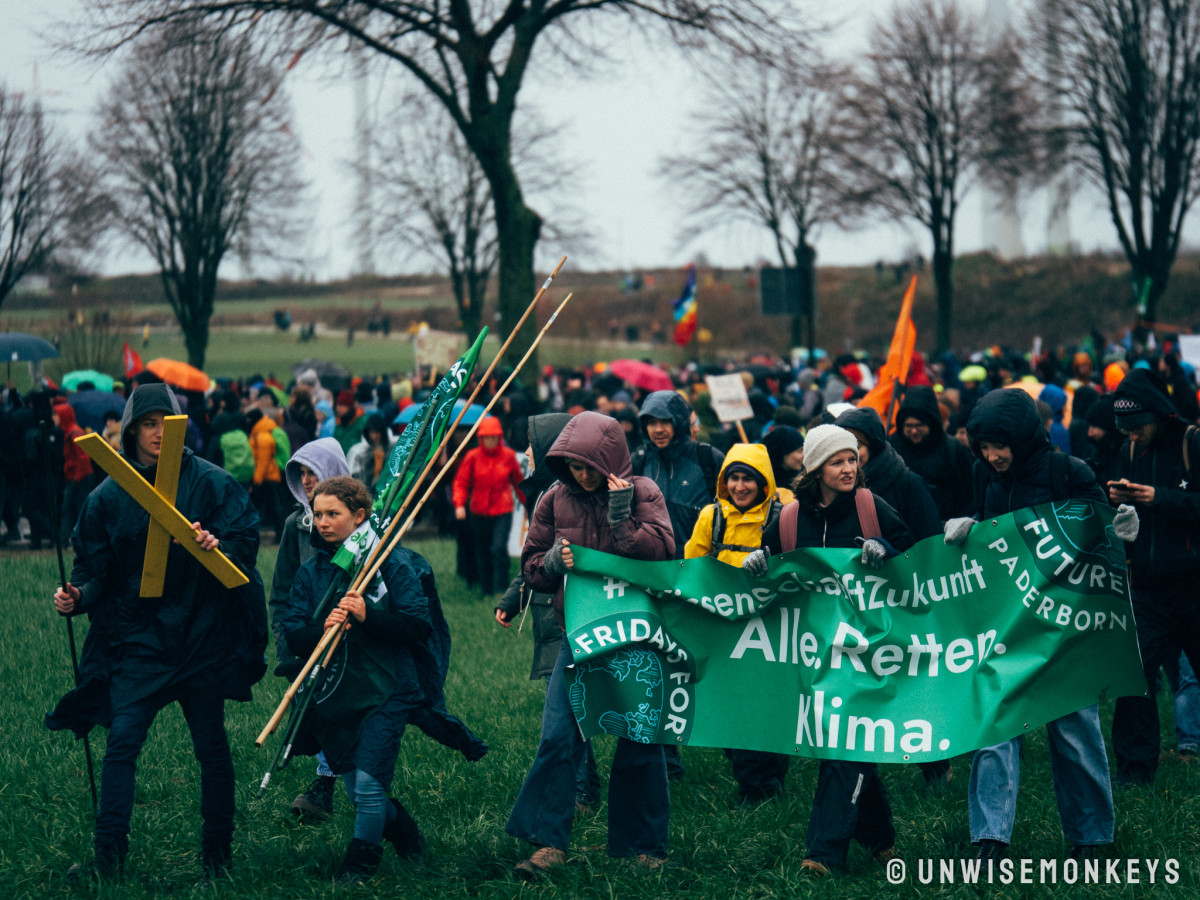
The Green Party's leadership has faced broad criticism from the climate movement for agreeing to the demolition of the village of Lützerath to expand a neighbouring mine as part of a larger deal to exit coal in western Germany by 2030. While leading Green politicians argue that bringing forward the coal phase-out in North Rhine-Westphalia (NRW) to 2030 is a major climate success, activists say that the village could have been saved, even when considering supply security in the energy crisis. Many are threatening to abandon support for the party, applying pressure on Green Party politicians to more seriously account for the demands of those who have backed the party until now. Read the report here.
Radical climate protests face broad rejection in Germany

With motorway and airport blockades as well as attacks on artworks, climate activists have caused a stir in Germany. The actions have provoked mainly negative reactions from politicians, the media and the general public, following overwhelming sympathy with the broader Fridays for Future movement. Many conservatives call for harsh punishments, with some even likening the activists to terrorists, while left-leaning observers have shown some degree of sympathy, but warn the escalation of protest methods is counterproductive. Researchers say the actions are an expression of growing frustration and diversification within the climate movement, which is struggling to find resonance during the energy crisis. But they don’t see a general trend towards a radicalisation of the broader climate movement. Read the article here.
Rise of radical actions risks dividing German climate movement – protest researcher
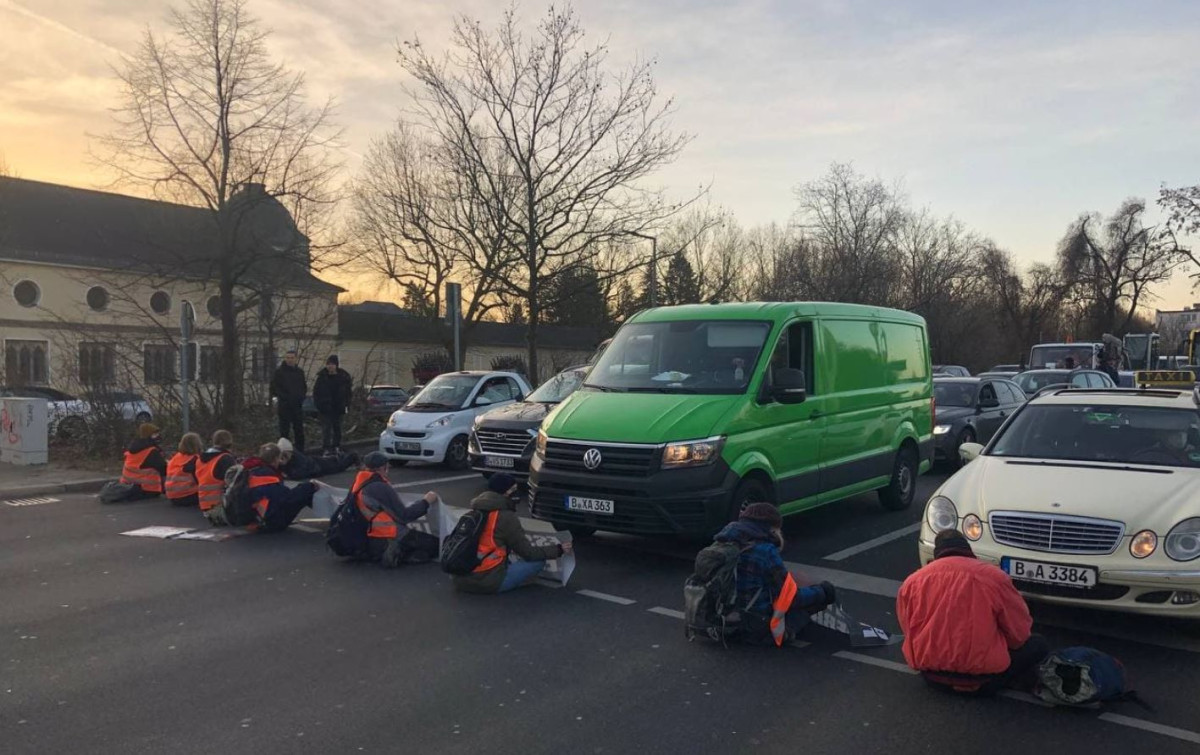
More drastic forms of climate protest such as recent hunger strikes and motorway blockades risk widening the divisions within the German youth climate movement, says social movements researcher Dieter Rucht from the Berlin Social Science Center. “If the climate movement should move toward more radical means of action, the division within the movement becomes clearer,” Rucht told Clean Energy Wire. Acts of non-violent civil disobedience by large groups can have a positive impact, Rucht said. "The real problem is when you go a step further and you commit acts of sabotage that are undertaken by a few." Read the interview here.
Hungary’s climate activists struggle to make their voices heard
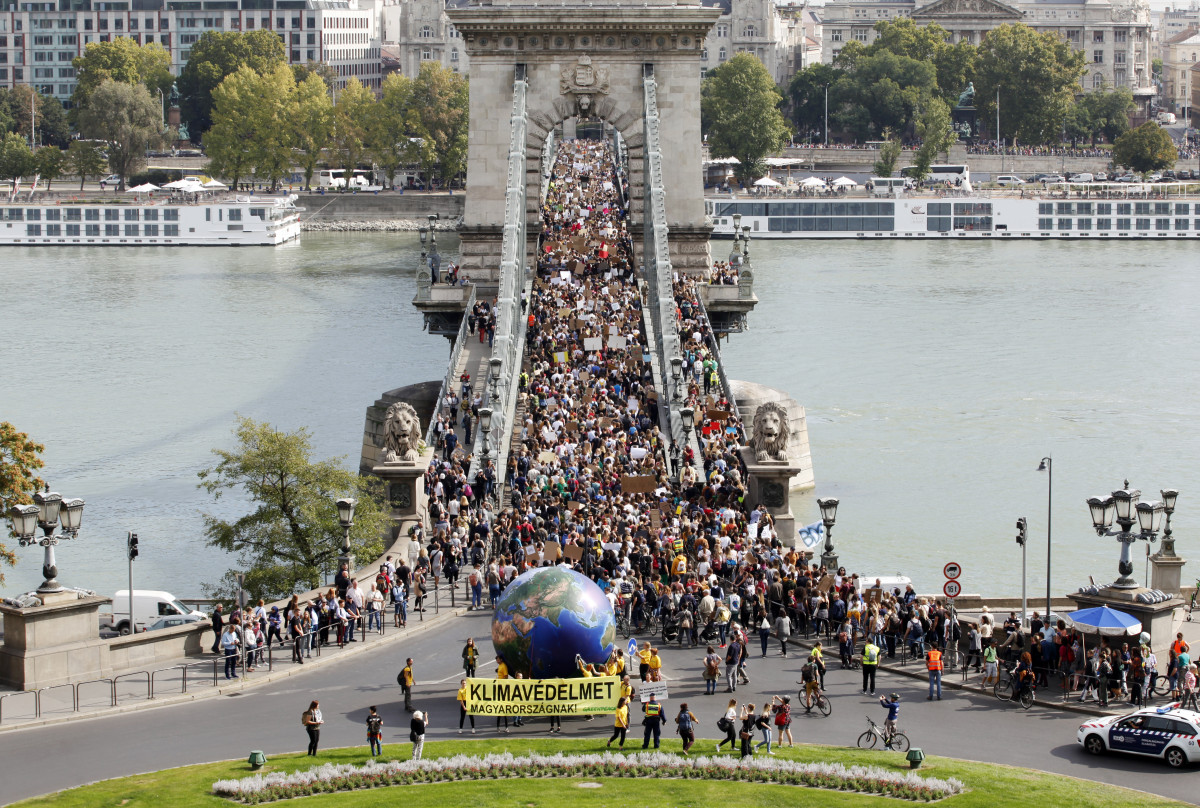
Hungary’s climate movement is struggling to build on the earlier success of the country's Fridays for Future student protests to make their voices heard. Nonetheless, many activists believe that spectacular acts of civil disobedience – such as motorway and airport blockades, or attacks on artworks, which have become common in Western Europe – would backfire, given the country’s increasingly authoritarian government, conservative society and biased media. Read the article here.
Climate activists from Fridays for Future have presented a list of demands for the first 100 days of a new German government. The activists first and foremost call for the adoption of a CO2 budget that is in line with the goal to limit global warming to 1.5°C, the lower boundary of the target outlined in the Paris Agreement. All new laws and infrastructure projects should be checked for compatibility with this budget. “We can't waste any more time with empty promises and need immediate action to preserve our livelihoods. The next government will decide whether we can still limit the climate crisis to a controllable level."
Read the article here.
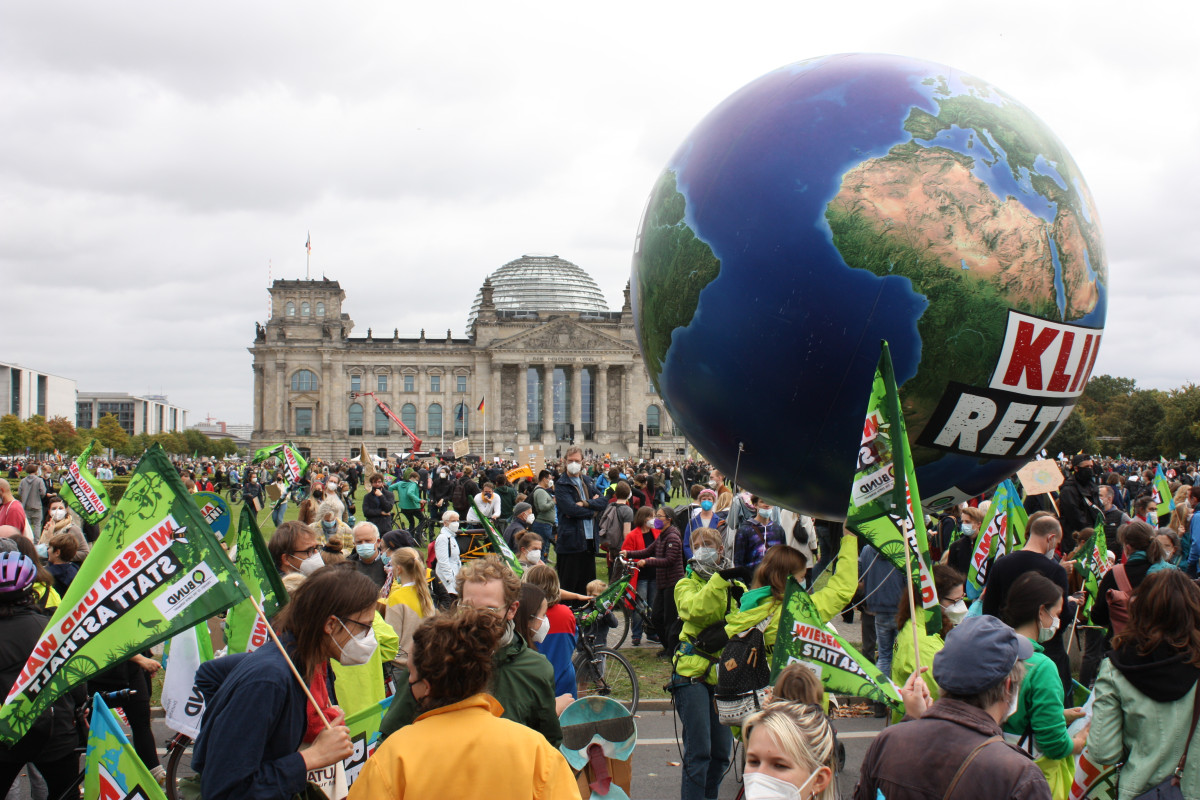
Youth climate movement Fridays for Future called for a rapid transition to climate neutrality at its eighth global climate strike just two days before the German federal election. Protests took place in hundreds of German towns and cities, with participants demanding all parties pursue socially just climate policies in line with the target of limiting global warming to 1.5°C. Swedish activist Greta Thunberg, who started the climate strikes in 2018, joined the demonstration in Berlin, where thousands of protesters assembled in front of the national parliament. “Without massive pressure from us on the streets, no coalition will stick to the 1.5°C limit after the election.”
Read the article here.
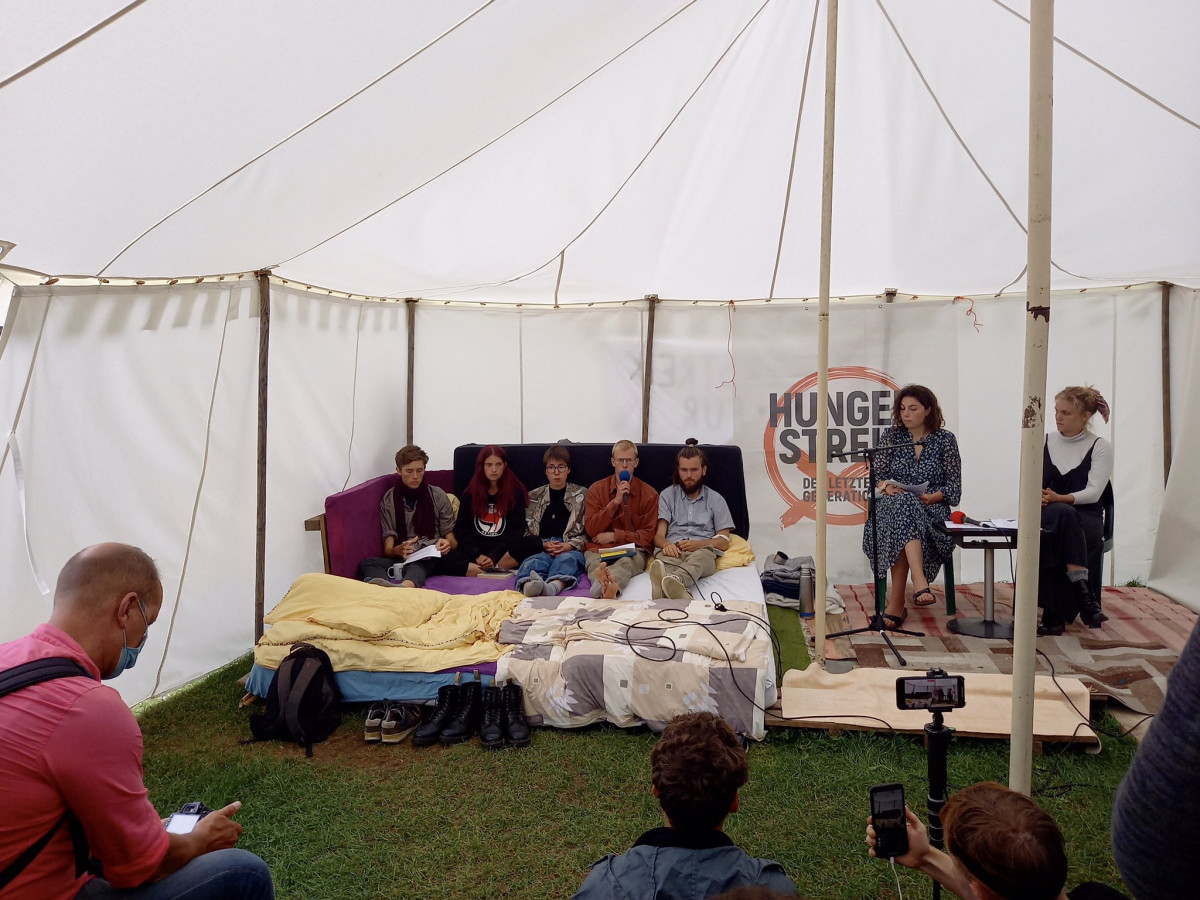
In the run up to the German federal election, a group of young people have entered a third week of a hunger strike to call for more climate action - with one of the protesters being temporarily admitted to hospital. The group, which calls itself the ‘last generation’, vows to continue their strike until they can publicly meet with the three leading chancellor candidates. In a joint reply, Annalena Baerbock (Green Party), Armin Laschet (CDU) and Olaf Scholz (SPD) agreed to a private in-person meeting with the activists, but only after the election and on the condition that the hunger strike be ended. A recent survey shows young people worldwide experience anxiety in response to the climate crisis and government inaction on the issue.
Read the article here.
Activists from the coalition group ‘August Rise Up’ took to the streets in Berlin on Monday 16 August to call for more climate action six weeks ahead of the German federal election. Around two hundred people blocked the road in front of the Brandenburg Gate for several hours, while a few dozen activists set up a sit-in demonstration in the nearby Monbijoupark -- adding up to a lower turn-out than organisers expected. The actions kicked off a week of protests organised by Extinction Rebellion, Fridays for Future and around 50 other climate action groups, ahead of the federal election and Berlin state election on 26 September.
Read the article here.
In Poland, the debate about climate change has only recently gained mainstream attention. Two main stumbling blocks – the economy’s strong dependency on coal and the conservative political climate – have caused years-long political inaction on the issue. Yet, the three-year-old climate movement has now successfully managed to initiate public conversation on the topic. But unlike their Western European counterparts, most Polish climate activists are careful not to speak up about other progressive issues such as women’s rights – which have recently come under further threat in the country – or economic inequality, fearing they will lose the support of the conservative majority to act on the climate issue at all.
Read the article here.
After catastrophic floods hit the south of Germany in July, killing over 180 people and leaving dozens more missing, activists have been calling for more climate action. "There is no denying that this disaster is the result of climate policy that has ignored any warnings from science for decades and that a global climate crisis is coming our way," said activist Fabian Pesch from Fridays for Future. "These catastrophes must have political consequences," said frontwoman Luisa Neubauer during a speech in Berlin. Environmental group Robin Wood embarked on a three-week raft tour from Berlin to Hamburg in order to push for a faster energy transition. “We need a rapid expansion of decentralised renewables, the promotion of energy efficiency, and the elimination of all government funding for fossil fuels."
Read the article here.
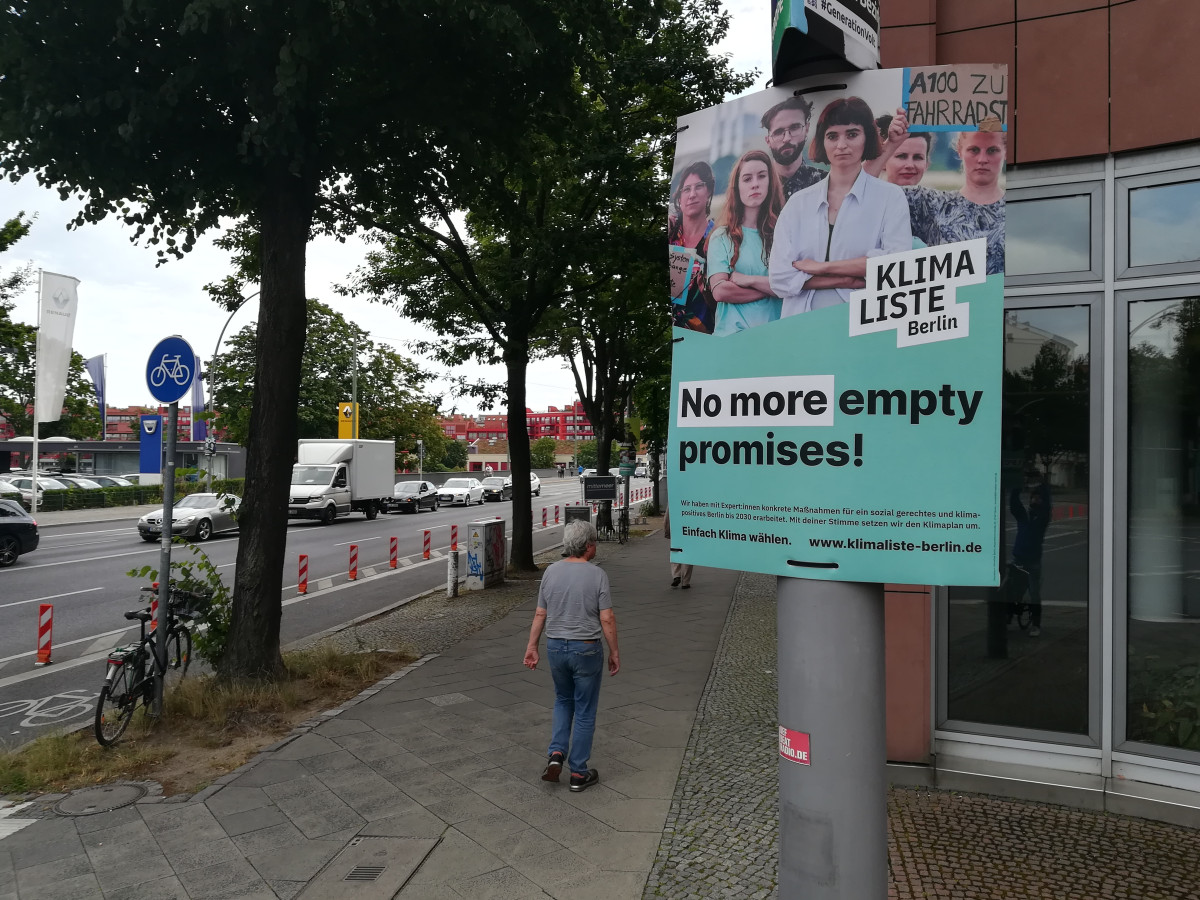
The German activist group Climate List (Klimaliste) has announced the establishment of a national political party, but will not yet run in the upcoming federal elections in September. Instead the party will support climate activists running for parliament as direct candidates and it will participate in the Berlin state election, which takes place on the same day. Klimaliste aims to “challenge the established parties" and steer them towards a clear commitment to limiting global warming to 1.5 degrees Celsius. Klimaliste is seen as a direct competitor of the Green Party, which some climate activists have criticised for adopting a too moderate tone regarding climate action in a bid to lure voters away from more conservative-leaning parties. While the party has managed to gain seats in elections at the municipal level, the activist group so far has participated in three state elections and failed to clear the five-percent threshold to enter parliament in either one of them.
Read the article here.
Climate justice means more than getting to net-zero
Increasingly so, the Fridays for Future school strikers are speaking up about social issues including racism, feminism, LGBTQ rights, and economic inequality. Above all, they call for a just transition - a sentiment that has been growing in the wake of the pandemic and last year’s Black Lives Matter protests. To push this intersectional agenda, Fridays for Future is forming alliances with anti-racism groups and trade unions. But not all climate advocates agree that a broad progressive movement is the best way to get to net-zero, as illustrated by the recently founded conservative KlimaUnion (‘climate union’), which calls for a market-based approach to reaching the 1.5-degree Paris Agreement goal. Does broadening the scope to social issues take the focus away from climate, or can it strengthen the movement and make it more impactful?
Read the article here.
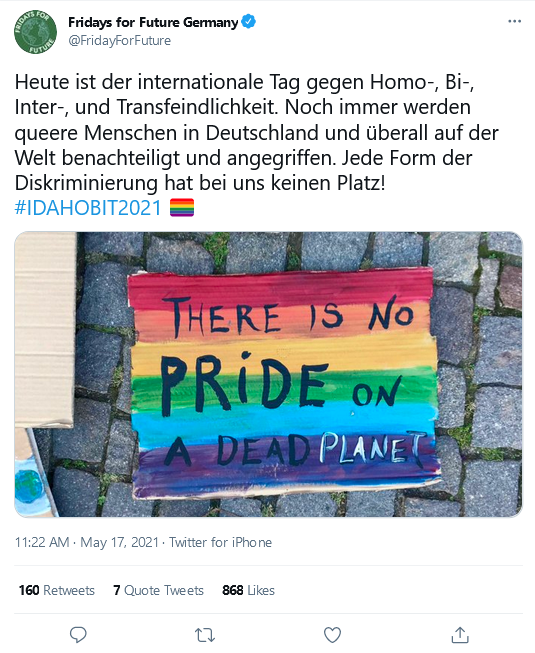
Like in Germany, activists in the United Kingdom are divided about the best way to fight the climate crisis. The UK is leading the world in terms of climate targets as it heads towards COP26. This is in no small part due to the work of climate action groups such as Extinction Rebellion. But now that the government has set climate targets, the movement is turning to the harder question of how to reach them. The government is pursuing a green capitalist approach to the transition. Many in the climate movement, however, consider this insufficient; they want to see a radical overhaul of governance and society.
Read the article here.
In April 2021, Germany's highest court ruled that the government's climate regulation fell short, lacking detail on emission reduction targets beyond 2030, in a case started by climate activists from Fridays for Future. Activists said the ruling was a timely decision ahead of Germany's federal election this year. "Climate action is not ‘nice-to-have’, it’s our fundamental right and from today we know that officially," said Luisa Neubauer, one of the leading figures of Fridays for Future. "It gives us everything we need for this year, for this federal election campaign, and for our future work as a movement.”
Following the case, the German government under Chancellor Angela Merkel pulled forward its net-zero target by five years to 2045, and raised the country's emissions reduction targets for 2030 to 65 percent (previously 55%) and 2040 to 88 percent (previously no target).
Read the article here.
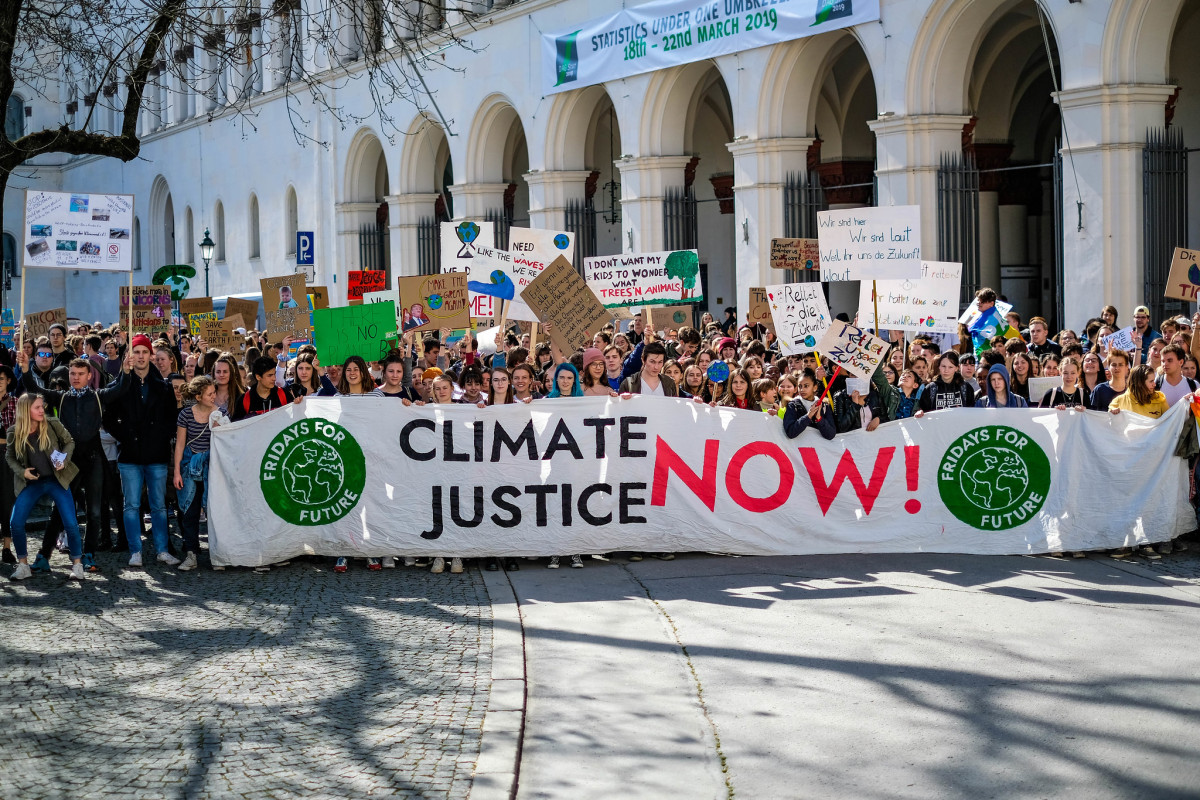
Trading street protests for seats in parliament
Climate activists agree on one thing: Germany needs to adopt radical climate policies in order to limit global warming to 1.5 degrees. How best to push this agenda is a different question entirely. In this German “super election year”, counting six state elections and a federal election with the selection of a successor to Chancellor Angela Merkel, some activists are running for office in the hopes of changing policy from the inside - though the Green Party is not the inevitable partner for all of them. Others are determined to stay on the outside, knowing that compromise is an inevitable part of the political process and insisting instead on pressuring all parties to adopt more ambitious climate plans. "We need to make sure all parties are in line with the Paris Agreement."
Read the article here.
Since the pandemic has stifled the possibility of organising mass demonstrations, Fridays for Future activists have turned to soft lobbying instead. The youth climate activists have had meetings with several politicians, including Chancellor Angela Merkel, EU Commission President Ursula von der Leyen and EU Commission vice-president Frans Timmermans on topics such as the coronavirus economic stimulus packages and the EU agricultural reform.
Read the article here.
"My decision to run for office is based on the disparity between protest and actual decision-making processes. We have to close that gap."

In the run up to the German election year 2021, Clean Energy Wire interviewed two Fridays for Future activists with different approaches to the climate fight. The 20-year old Jakob Blasel will run for parliament on a Green Party ticket in September. He said his decision to go into politics was based on the need to "close the gap between protest and actual decision-making". Blasel added that a strong Green Party is the only realistic option to tackle climate issues in Germany – provided that the party keeps their policies in line with 1.5 degrees warming. His 23-year old counterpart Carla Reemtsma disagrees that the Greens are a natural partner of the climate movement, saying they "have profited a lot from the climate movement. But they didn’t move closer to the movement for example by adjusting their climate policies." Reemtsma argues its Fridays for Future's job to radicalise all political parties to adopt ambitious climate policies.
Inspired by then 16-year-old Swedish schoolgirl Greta Thunberg, students across the world started organising school strikes for the climate in late 2018 and early 2019. In Germany, thousands of students took to the streets. "I'm really mad at how politicians are threatening my future" by not acting on the climate crisis, said climate activist Jakob Blasel.
Read our factsheet here.
As the school strikes started to grow, German Chancellor Angela Merkel said she “strongly welcomes” the rise of student protests for the climate. While Merkel's comments were welcomed by climate activists, some members of her own party complained the chancellor is encouraging truancy and undermines "responsible" teachers and headmasters.
Read the article here.
In March 2019, tens, possibly hundreds of thousands of students poured into the streets in cities across Germany to demand more action on climate change in one of the biggest showings for the Fridays for Future movement until then. The student protest took place simultaneously in scores of countries around the world, from New Zealand to Uganda to the US. In Germany, the protests prompted a debate in the parliament, and drew both support and criticism from public figures across the political spectrum.
Read the article here.
Ahead of the European election in May 2019, tens of thousands of people demonstrated with Fridays for Future in Germany, joining protesters in over 100 countries. The young activists, many of whom awere not yet eligible to vote, called on youth across Europe to make their vote count. “If you, like me, are determined to bring attention to the ongoing climate crisis […], then going to vote is one of the most powerful things you can do,” said Swedish Greta Thunberg, who started the movement almost a year ago, in a message on instagram. “This is your chance as a young European citizen to have a say on what issues are prioritised in the EU for the next five years.”
Read the article here.

